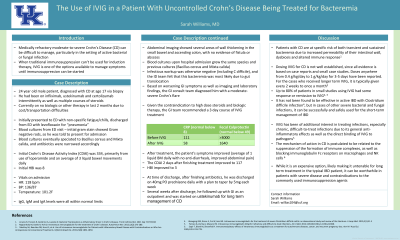Back


Poster Session E - Tuesday Afternoon
Category: IBD
E0427 - The Use of IVIG in a Patient With Uncontrolled Crohn’s Disease Being Treated for Bacteremia
Tuesday, October 25, 2022
3:00 PM – 5:00 PM ET
Location: Crown Ballroom

Has Audio

Sarah Williams, MD
University of Kentucky
Cleveland Heights, OH
Presenting Author(s)
Sarah Williams, MD
University of Kentucky, Lexington, KY
Introduction: Medically refractory Crohn’s Disease (CD) in a patient with multiple comorbidities can be a frustrating course for both patient’s and physicians. This is a case report of a patient with uncontrolled CD and bacteremia from gut translocation who was treated with IVIG with some improvement in his subjective symptoms and laboratory markers of CD flare.
Case Description/Methods: This is a 24 year old patient who was diagnosed with CD via biopsy at age 17. He had been intermittently on infliximab, ustekinumab and certolizumab but had issues with insurance and transportation and had not been on any biologic therapy in the last 2 months. He was seen in the ED and discharged on oral antibiotics and was admitted after blood cultures from this visit were positive for gram negative rods, eventually speciating to Bacillis cereus and Mixta calida. He was treated initially with broad spectrum antibiotics for bacteremia with suspected source of gut translocation. Based on his worsening GI symptoms abdominal imaging and labs (CRP 111 (normal under 8) and fecal calprotectin >3000 (normal under 49), he was also diagnosed with a flare of his CD. IVIG was initiated on hospital day 3 since steroids and biologics couldn’t be used in acute infection. He received 3 doses of IVIG and finished his course of IV antibiotics for bacteremia and had some improvement in his subjective symptoms as well as lab results (CRP 58 and fecal calprotectin 1640). Several weeks after the resolution of his acute infection, steroids and then ustekinumab were restarted to achieve better long-term control of his CD.
Discussion: While IVIG is not a frequently used treatment for uncontrolled CD, in certain circumstances, it can be beneficial, especially when other treatment options are contraindicated due to active infection. It has not been found to be effective in IBD with recurrent Clostridium difficile infection, but in cases of other severe bacterial and fungal infections, it can be successfully and safely used for the short-term management of IBD. Up to 80% of patients in small studies using IVIG had some response or remission to IVIG, so while it is an expensive option, it may be worthwhile in patients with severe disease and contraindications to typically used immunosuppressants.
Reference:
Merkley SA, Beaulieu DB, Horst S, et al. Use of Intravenous Immunoglobulin for Patients with Inflammatory Bowel Disease with Contraindications or Who Are Unresponsive to Conventional Treatments. Inflamm Bowel Dis. 2015;21(8):1854-1859.
Disclosures:
Sarah Williams, MD. E0427 - The Use of IVIG in a Patient With Uncontrolled Crohn’s Disease Being Treated for Bacteremia, ACG 2022 Annual Scientific Meeting Abstracts. Charlotte, NC: American College of Gastroenterology.
University of Kentucky, Lexington, KY
Introduction: Medically refractory Crohn’s Disease (CD) in a patient with multiple comorbidities can be a frustrating course for both patient’s and physicians. This is a case report of a patient with uncontrolled CD and bacteremia from gut translocation who was treated with IVIG with some improvement in his subjective symptoms and laboratory markers of CD flare.
Case Description/Methods: This is a 24 year old patient who was diagnosed with CD via biopsy at age 17. He had been intermittently on infliximab, ustekinumab and certolizumab but had issues with insurance and transportation and had not been on any biologic therapy in the last 2 months. He was seen in the ED and discharged on oral antibiotics and was admitted after blood cultures from this visit were positive for gram negative rods, eventually speciating to Bacillis cereus and Mixta calida. He was treated initially with broad spectrum antibiotics for bacteremia with suspected source of gut translocation. Based on his worsening GI symptoms abdominal imaging and labs (CRP 111 (normal under 8) and fecal calprotectin >3000 (normal under 49), he was also diagnosed with a flare of his CD. IVIG was initiated on hospital day 3 since steroids and biologics couldn’t be used in acute infection. He received 3 doses of IVIG and finished his course of IV antibiotics for bacteremia and had some improvement in his subjective symptoms as well as lab results (CRP 58 and fecal calprotectin 1640). Several weeks after the resolution of his acute infection, steroids and then ustekinumab were restarted to achieve better long-term control of his CD.
Discussion: While IVIG is not a frequently used treatment for uncontrolled CD, in certain circumstances, it can be beneficial, especially when other treatment options are contraindicated due to active infection. It has not been found to be effective in IBD with recurrent Clostridium difficile infection, but in cases of other severe bacterial and fungal infections, it can be successfully and safely used for the short-term management of IBD. Up to 80% of patients in small studies using IVIG had some response or remission to IVIG, so while it is an expensive option, it may be worthwhile in patients with severe disease and contraindications to typically used immunosuppressants.
Reference:
Merkley SA, Beaulieu DB, Horst S, et al. Use of Intravenous Immunoglobulin for Patients with Inflammatory Bowel Disease with Contraindications or Who Are Unresponsive to Conventional Treatments. Inflamm Bowel Dis. 2015;21(8):1854-1859.
Disclosures:
Sarah Williams indicated no relevant financial relationships.
Sarah Williams, MD. E0427 - The Use of IVIG in a Patient With Uncontrolled Crohn’s Disease Being Treated for Bacteremia, ACG 2022 Annual Scientific Meeting Abstracts. Charlotte, NC: American College of Gastroenterology.
